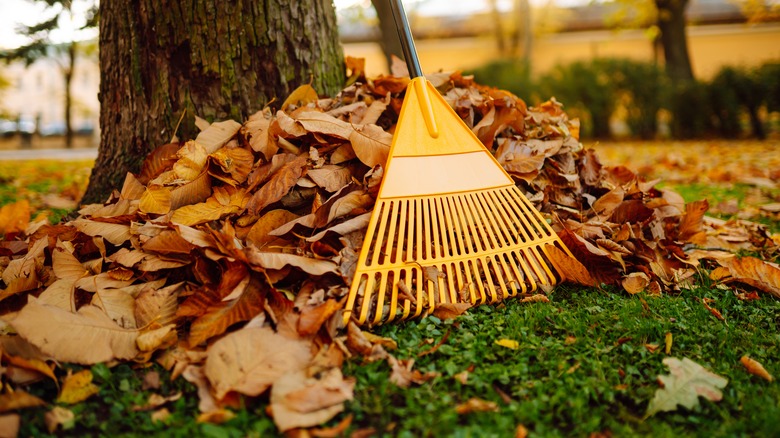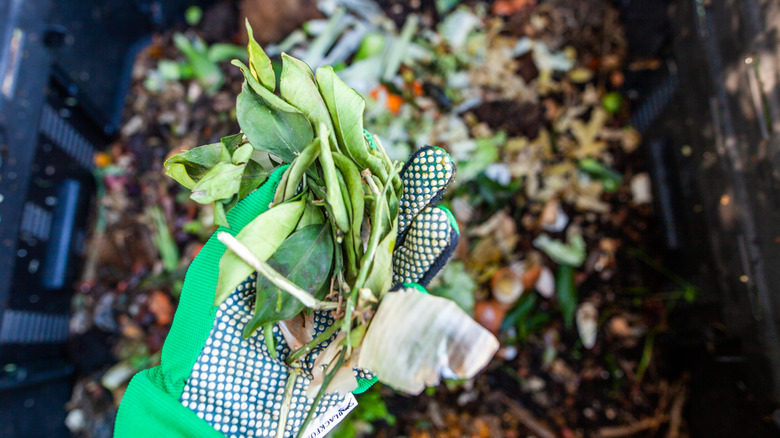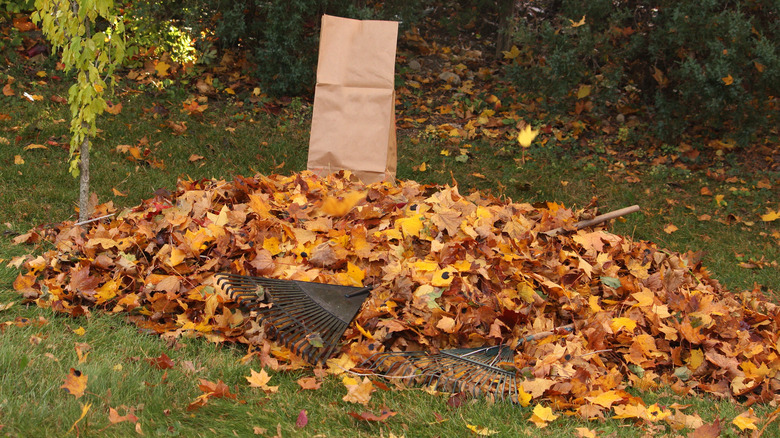Use Fallen Leaves To Give Garden Soil An Extra Boost. Here's How
When autumn rolls around, it's a common practice to rake, bag, and dispose of the fallen leaves. This chore is time consuming and doesn't really end until tree branches are completely bare. Contrary to popular belief, however, fallen leaves are powerhouses of nutrients that can actually aid your soil's health if you know what to do with them. Rather than wasting your precious hours collecting and disposing of dead leaves this fall, why not put them to work in your garden? You can use them as mulch or in a compost pile.
Leaves have long been viewed as an annoying side effect of autumn, but this could not be further from the truth. As organic matter, leaves are chock full of valuable nutrition as they decompose. While you can certainly dispose of them, an even better option is to utilize your newly collected leaves for future gardening needs — don't worry, it's easy to do.
Methods for using fallen leaves in the garden
You can use fallen leaves to help boost your soil's health in a number of ways. The approach you choose will be informed by your particular needs and how involved you'd like to be in the process. The easiest way to put your leaves to work is to use them as mulch on top of your garden beds — this works well whether you have a vegetable or flower garden. Simply wait until the leaves are fairly dry and wear garden gloves to help protect your skin as you roughly shred the leaves. This process can be time-consuming, however, and may not work well if you have multiple piles to shred. You can instead utilize a push mower to cut up the pile of leaves before spreading it over your garden beds. Over time, worms and natural processes of decomposition will help the leaves' nutrients seep into the soil.
Though a slower approach, adding your leaves to a composting bin and stirring the contents will speed up the decomposition, thanks to the elements in the dirt and other plants. Once the leaves have broken down, you can implement them into soil for your vegetable or flower garden beds. Working leaves into the dirt will not only infuse the ground with extra nutrients but will help with keeping moisture in the soil and adding much-needed aeration to the ground. In the winter, you can also use shredded leaves as protection against freezing for less hardy plants. Beginning this practice after the temperatures are consistently freezing will keep your plants from the death-blow cycle of freezing and thawing continually.
Best ways to collect fallen leaves to aid your soil
The process of collecting leaves for future use can be accomplished in a number of ways. Firstly, you can employ the tried and true practice of raking. This is pretty self-explanatory and you can save the leaves in plastic or paper composting bags until you're ready to spread them in your garden beds. Another method for gathering your leaves is using your lawn mower with a bag attached to mulch them. Using the mower will ensure that your leaves are chopped up and will break down quickly the rest of the way. While some individuals don't like this method, as there are potential drawbacks to mulching in this manner, the fact that the lawn mower will also collect dirt and grass clippings mixed in with the leaves will speed up the leaves' decomposition, as formerly mentioned.
While you may think it's best to wait until the leaves have dried in the mid afternoon before raking and bagging them, slimy and rotting leaves are just a symptom of their decomposition. Other than the nasty feeling on your hands (which can easily be avoided by wearing gloves), the squishy leaves will actually help your soil more than crunchy dry leaves will. If bagging leaves is not your style, you may be able to find a corner of the yard that is sheltered from autumn winds by trees and other plants. Collecting leaves like this is a fine option but beware that critters and insects may seek the pile out for shelter. For this reason, it's imperative to never stash leaves against your house, as it may lure termites and rodents too close to your home for comfort.


